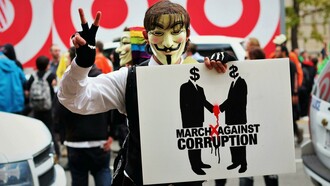Scholars such as Raleigh (2020) argue that at the beginning of COVID-19, individuals such as United Nations Secretary-General Antonio Guterres saw the pandemic as a way for disputing parties to resolve conflict as they were faced with a common enemy. It can be understood that Antonio Guerres saw the pandemic as an opportunity for dialogue for peace. However, there was a rise in armed conflicts in Libya and Mozambique. In comparison, South Africa suffers from sudden eruptions of riots or protests due to socio-economic problems.
Security uncertainty: protests in the amidst of COVID-19
Belle et al. (2020:2) argue that informal settlements are often the result of socio-economic neglect caused by politicians. Residents from informal settlements are often in continuous conflict because of social justice. In the case of South Africa, informal settlement communities are often neglected and are remembered when it is election time. COVID-19 exposed the harsh reality people faced in informal settlements when they were requested to stay indoors. There is no social distancing, as informal settlements are overcrowded.
Residents from Khayelitsha, Cape Town, South Africa, protested for water amidst COVID-19. The Khayelitsha residents stated that they need water to curb the spread of COVID-19. Insufficient public services rendered by the South African government demonstrated their failure to address the socio-economic crisis regarding basic needs. An inadequate supply of essential needs services such as sanitation leaves residents vulnerable to COVID-19. (Belle et al., 2020:2)
Nyashuna et al. (2020) note that most people from informal settlements work in the informal economy as domestic workers and gardeners, some in restaurants. However, many companies/employers have reduced employees due to the impact of COVID-19 measures. The employees' reduction entails that people lost their income during the lockdown. Churches have rescued many through food donations across South Africa as there is perceptible hunger caused by income loss.
The economic distress caused by job losses leads to social harms such as theft and violence (Nyashuna et al., 2020); the protests in Khayelitsha demonstrate this. Khayelitsha protest is not the only riot in the COVID-19 era. South African socio-economic crisis and political negligence paved the way for mass riots. The mass demonstrations show that citizens are not satisfied with the current measures followed by the government.
Minibus taxi-drivers protests
COVID-19 influenced various protests across rural and urban areas in South Africa. Taxi Drivers associated with South Africa National Taxi Council argued against some of the COVID-19 measures undertaken by the government. Mogomotsi (2020) asserts that the taxi drivers began protests in Johannesburg in June 2020, stating that the relief packages offered by the government are inadequate because the 70% transport capacity regulation and working hours implemented by the government are affecting their profits.
The South African government offered a relief fund of ZAR 1.1 Billion, which amounts to ZAR5000 per taxi driver (Thomas, 2020). However, Johannesburg and Pretoria's economic activities halted as some people failed to pitch for work, and delivery trucks stopped because of roadblocks; this led to police, military and taxi drivers' confrontations; further protests remain possible (CRISIS24, 2020).
Health workers protests
In September 2020, National Education, Health and Allied Workers led a protest in Pretoria and Cape Town. The protest demonstrated mass dissatisfaction with corruption and partial employment of community health workers (Sibeko, 2020). Sibeko (2020) further argue that the South African healthcare workers demanded proper working conditions, as they have an inadequate supply of protective gear amid COVID-19. They urged the government to end the high level of corruption in attaining coronavirus protective kits. (Thomas, 2020).
Corruption plays a role in security uncertainty, leading to violent protests. For instance, Taxi drivers blocked several roads in Gqeberha (Port Elizabeth) in May 2021, demanding their Unemployment Insurance Fund and Employee Relief Scheme, stating that they had not received their relief package due to corrupt taxi owners (Sizani, 2021).
Mubangizi (2021) asserts that COVID-19 exposed how the South African community is characterised by corruption and greed, with culprits mismanaging financial resources. For example, there were sales of food groceries meant for the poor and maladministered ZAR500 billion relief package. As a result, corruption became one of the reasons leading to widespread protests across the country.
Non-governmental organisations protest
There has been a mass demonstration against corruption to the South African Council of Chambers in Durban and Pietermaritzburg joining protests. At the beginning of the pandemic and South African measures to curb the spread of COVID, leaders from churches marched to the offices of Premier Zikalala Sihle, demanding the end of corruption connected to food vouchers, funds for informal traders and small businesses (Karen, 2020). Thomas (2021:3) notes that the protests respected social distancing measures; four to six people rotated every fifteen and twenty minutes.
Impact of COVID-19 on the South African tourism sector
Thomas (2021:4) touches on the impact brought by COVID-19 on the socio-economic factors in South Africa. The lockdown regulations led to widespread protests as citizens lost jobs due to business closures. One of the economic sectors affected by COVID-19 measures is the tourism and hospitality section. Tourism Business Council of South Africa (2020) stated that 83% of tourism businesses released a report showing a 50% decrease in profits, and 58% of the business could not meet fixed costs expenses leading to the inability to finance their debt.
Employers in the hospitality sector marched to parliament in Cape Town, arguing that the lockdown measures had forced most businesses to shut down, which caused them to be without income, leading to an increase in the unemployment rate. In addition, Thomas (2020:4) is of the view that the negative impact brought by COVID-19 on socio-economic factors causes people to be vulnerable to looting activities. For example, the Booysens squatter camp community blocked roads with rocks, and several burning tires further looted stores (Mengjo, 2020).
South Africa is going downhill because protests erupt more than they did years back. The worsening economic conditions are playing a role in riots. People are living in deplorable conditions while politicians are cruising nicely. The ZAR350 ($20) per month grant introduced by the South African government to address poverty remains an insult to the living conditions of the general public. During the pandemic, people lost jobs; currently, the majority are poor, and it is impossible to survive on $20 per month. As long as the government does not address the country's economic conditions, then socio-economic challenges such as crime, protests and looting will remain high.
References
Belle, S.V., Affun-Adegbulu C., Soors, W. Srinivas, P.N, Hegel, G., Damme, W.V., Saluja, Abejirinde, L., Wouters, E. Masquiller, C., Tabana, H., Chenge, F., Polman, K., & Marchal, B. 2020. COVID-19 and informal settlements: an urgent call to rethink urban governance. International Journal for equity health.
Crisis 24. 2020. South Africa: Taxi drivers protest in Pretoria and Johannesburg (Gauteng Province) on the 22nd of June.
Karen, S. 2020. Church leaders protest against Covid-19 graft.
Mengnjo, T. 2021. Protests during the 2020 COVID-19 lockdown in South Africa. MoLab Inventory of Mobilities and Socioeconomic Changes. Department ‘Anthropology of Economic Experimentation’. Halle/Saale: Max Planck Institute for Social Anthropology.
Mogomotsi, M. 2020. South Africa's Minibus Taxis Go on Strike, Hitting Workers. U.S. News. The 22nd of June 2020.
Mubangizi, J.C. 2021. Poor lives matter: COVID-19 and the plight of vulnerable groups with specific reference to poverty and inequality in South Africa.
Nyashanu., Simbanegavi, P., & Gibson, L. 2020. Exploring the impact of COVID-19 pandemic lockdown on informal settlements in Tshwane Gauteng Province, South Africa, Global Public Health, 15:10, 1443-1453, DOI: 10.1080/17441692.2020.1805787.
Raleigh, C. 2020. The pandemic has shifted patterns of conflict in Africa.
Thomas, T. 2021. Protests during the 2020 Covid-19 lockdown in South Africa. Max Planck Institute.
Tourism Business Council of South Africa. 2020. Tourism Industry Survey of South Africa: COVID-19 Impact, Mitigation and the Future.
Sibeko, S. 2020. South Africa healthcare workers protest, threaten strike. Aljazeera. 3 September 2020.
Sizani, 2021. Taxi drivers bring Gqeberha to standstill over Covid-19 funds.















